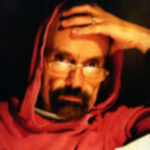Leather Blues
Author’s Foreword
Leather Legacy
The Sexual Infinity of Leather
I wrote Leather Blues for the pleasure of it, to capture life as we lived it. I completed the manuscript in 1969, and the novel has had a wonderful life. Leather Blues is a picaresque coming-out story of a roguish boy eager to learn the ropes, the rituals, and the sexual infinity of leather.
Because it was written a year before the Stonewall Rebellion, and fifteen years before gay book publishers came into existence in the mid-1980s, it was first published as a zine on a spirit duplicator in a limited edition of one hundred copies by Lou Thomas at Target Studio in 1972—under its original working title I Am Curious (Leather). In 1978, it was announced as a forthcoming Drummer book, and was excerpted in Son of Drummer. It was serialized in Man2Man Quarterly 1981-1982. In 1984, Gay Sunshine Press published the first trade paperback of ten thousand copies. The text of this new edition is exactly the same as it was in 1969.
Readers and reviewers have ardently supported Leather Blues, which has been excerpted over the years in many gay magazines, becoming part of gay popular culture. Every author wishes for such enthusiasm.
Perhaps such a growing acceptance of boldly sexual literature shows the maturity of gay diversity at long last embracing the erotic literary fiction that defines our homosexuality better than does non-erotic gay literature.
Once scorned, erotic literature is now admired, and given awards for being good yarns well told. In our gay world built on subcultures, leatherfolk are the passionate few who have given pedigree to this novel, pushing it into the canon of the gay literary mainstream.
Leather Blues is a signature book that, driven by this passion of its fans, has, for nearly fifty years, stood the test of time which has encoded Leather Blues as a textual eyewitness of our leather roots before Stonewall. Its status as an iconic leather book, I hope, does not diminish the entertainment impact of its intended eroticism.
In revolutionary 1969, this seminal novel was considered erotically radical. Post-HIV, it seems even more sexually avant garde.
In terms of characters, structure, scenes, psychological flow, imagery, iconography, and dialogue, literary historians analyzing our gay roots, might note that Leather Blues reflects the 1950s-1960s gay zeitgeist of post-World War II masculine identity expressed by Marlon Brando in The Wild One, and by auteurs of independent films from the sexual underground: Kenneth Anger, Scorpio Rising, Kustom Kar Kommandos; John Waters’ favorites George and Mike Kuchar; Andy Warhol, Blowjob, Bike Boy, the Velvet Underground; Roger Corman’s heavy-metal biker exploitation movies starring William Smith, such as The Wild Angels and Angels Die Hard; and Dennis Hopper, director of the counter-culture classic Easy Rider.
These artists, along with William Carney’s leather novel The Real Thing, John Rechy’s City of Night, and my friend James Purdy’s Eustace Chisholm and the Works, were some of the avatars enhancing my eyewitness life in leather. Generously compared by GLBT culture analysts and critics such as Michael Bronski and Ian Young to the novels of Jean Genet, Dennis Cooper, and Samuel Steward (Phil Andros), Leather Blues is gay identity literature representing gay male writing in the mid-twentieth century.
I wrote Leather Blues to be an authentic, erotic, romantic, psychological, and literary thriller, driven with scenes and dialogue that I tried to make as vivid and entertaining as the screenplays I admire. In fact, it is a movie disguised as a novel. Its scenes and dramatic arc are cinematic. Its “voice” is its dialogue.
The essence of Leather Blues is not merely the magical thinking of masturbatory desire so much as it is also a dramatized documentary of the way we were.
Leather Blues exists like a note in a bottle from the golden age of wild leather liberation before Stonewall and HIV turned mid-century gay sex into ancient history.
To project diverse perspectives within the cinematic narrative, I wrote the story in the “omniscient third person voice,” not the typical “autobiographical first person” favored by most writers of erotica. My goal was to give readers “insider access” to dialogue-driven characters, plot, and sexuality they could identify with erotically.
In all my writing, I try to create erotic literature that begins in the head and works its way down. That reviewers have found the rhythms of poetry in my sentences, and male romance in my plot, and existentialism in my themes is satisfying because erotic literature is not written in an intellectual or emotional vacuum.
Respecting sexuality, I always intend my words and rhythms to turn readers onto their own sexual pleasure. My humanist goal is to cause human orgasm: the ability to worship something recognized as core necessity in one’s human self.
There is no greater connection between author and reader than the reader’s handheld salute to the action on the page. That’s the best review in the world.
Leather Blues is perhaps the leanest, meanest, and purist book I have written.
May my pleasure be your pleasure.
Jack Fritscher
San Francisco, 2011

